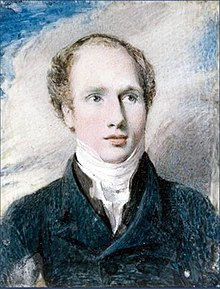George Keats | |
|---|---|
 Portrait of George Keats by Joseph Severn, 1817 | |
| Born | 28 February 1797 |
| Died | 24 December 1841 (aged 44) |
| Resting place | Cave Hill Cemetery Louisville, Kentucky, U.S. |
| Occupation | Politician |
| Nationality | British |
| Spouse | Georgiana Augusta Wylie |
| Children | 8 |
| Relatives | John Keats (brother) |
George Keats (28 February 1797 – 24 December 1841) was an American businessman and civic leader in Louisville, Kentucky, as it emerged from a frontier entrepôt into a mercantile centre of the old northwest. He was also the younger brother of the Romantic poet John Keats.
During the years from 1821 to 1841, Keats led a philosophical society, meant to overcome Louisville's raw culture, operating a literary salon in his living room which evolved into the Lyceum and then into the board of Louisville College, the precursor to the University of Louisville.[1]
In 1827, Keats was elected to the Ohio Bridge Commission, laying the foundation for the river's first crossing.[2] The state government appointed him to the board of the Bank of Kentucky in 1832.[3] He joined the boards of ten other organisations, including the Kentucky Historical Society and the Harlan Museum, which he headed. In 1841, he was elected to the city council.[4]
- ^ Crutcher, Lawrence M. (2012). George Keats of Kentucky. University Press of Kentucky. p. 226.
- ^ Johnston, J. Stoddard (1896). Memorial History of Louisville, vol. I. American Biographical Publishing Co. pp. 77–8.
- ^ Duke, Basil W. (1895). History of the Bank of Kentucky 1792-1895. John P. Morton & Company.
- ^ M. Joelin (1875). Louisville, Past and Present. John P. Morton & Co. p. 26.